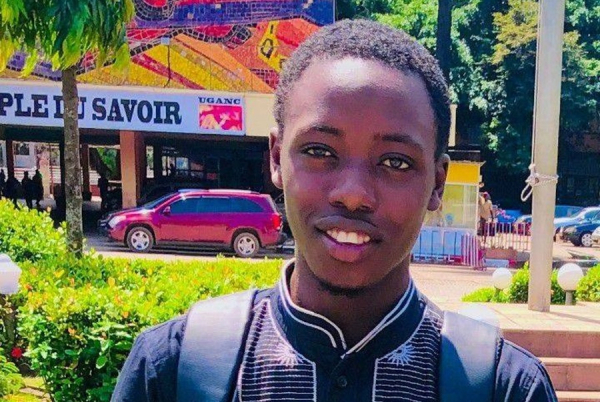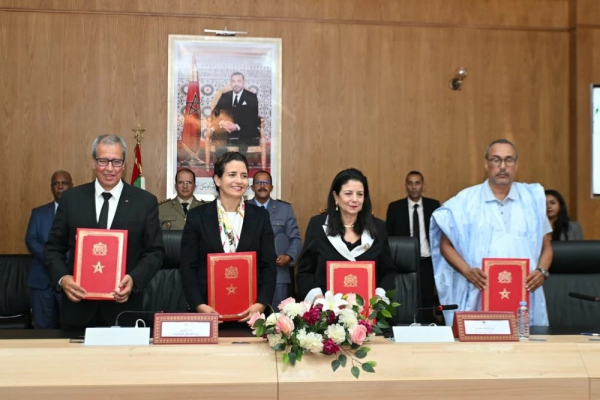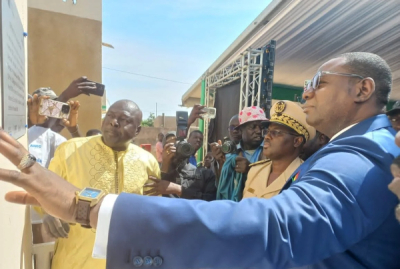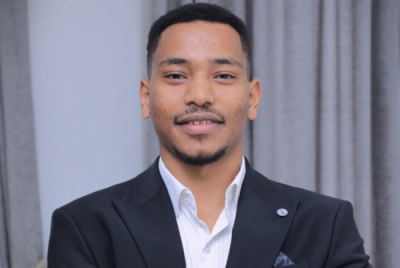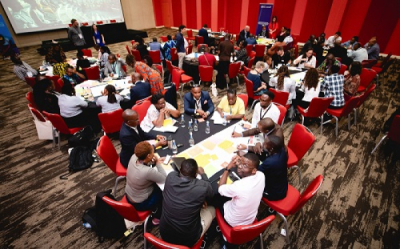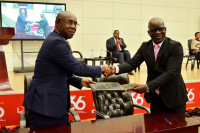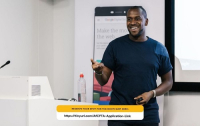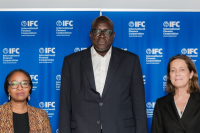-
Orange Digital Center partnered with Coursera in April 2024 to offer free digital training to young Africans.
-
Mamadou Alpha Baldé secured his first job immediately after earning his cybersecurity certification in August 2025.
-
He plans to become a tech entrepreneur and develop his own systems.
Orange Digital Center announced a partnership with Coursera in April 2024 to provide free digital training to young Africans. This initiative aims to accelerate access to high-value technology skills. Mamadou Alpha Baldé, a Guinean student, belongs to the first cohort that secured employment as soon as they completed their certification.
Baldé currently works as a technical sales engineering assistant at the IT firm Hestia SARL in Conakry. He develops software and supports commercial engineering operations. He attributes this position to the strategic diversification of his skills.
He initially trained in mobile and web development at Gamal Abdel Nasser University of Conakry. However, he says his cybersecurity certification, completed in August 2025, opened the door to a more stimulating professional environment due to the scale of the projects involved.
Before earning the certification, Baldé had no professional experience. Seeking to learn and improve his financial prospects, he joined Orange Digital Center while waiting for his bachelor’s degree ceremony scheduled for December 2025. He enrolled in the six-month "Google Cybersecurity Track", created under the April 2024 cooperation agreement between Orange Digital Center and Coursera. He discovered the opportunity on ODC’s Facebook page.
“My learning experience was very enriching. The content was well structured and easy to follow, the Coursera platform was intuitive and pleasant to use. I also appreciated the support and exchanges with the community, which helped me better understand key concepts and deepen my knowledge in cybersecurity,” he told We Are Tech.
During the program, Baldé discovered cloud security and web security, competencies he now applies in all his professional and personal projects. “I personally handle the security of all my servers using the tools studied during the program. If someone enters my system, I receive alerts by email and SMS. That is what I learned in the training.”
Although a partner company introduced him to Hestia SARL, he insists his academic background, certification and completed projects secured the job. “When I came in, I introduced myself, showed my certificates and my projects. They hired me the same day, right after the presentation.”
Baldé says the cybersecurity field fascinates him and motivates him to continue learning. He also expresses a clear long-term ambition: “to become an entrepreneur and create my own systems.”
This article was initially published in French by Melchior Koba
Adapted in English by Ange Jason Quenum
- Morocco to build 500MW renewable-powered data center in Dakhla
- Jazari Institute launched to advance AI, energy innovation and skills training
- Projects aim to boost tech jobs, digital sovereignty, and regional connectivity
Morocco plans to build a large renewable-powered data center and create a dedicated artificial intelligence (AI) institute in Dakhla, positioning the city as a strategic hub in the country’s digital and energy transition.
The government signed two partnership agreements on Friday, November 15, with Digital Transition Minister Amal El Fallah Seghrouchni, Energy Transition Minister Leila Benali and officials from the Dakhla-Oued Eddahab region.
The first agreement covers the construction of “Igoudar Dakhla,” a next-generation data center that will provide hosting, storage and data-processing services for domestic and international clients. The facility is planned to have a capacity of 500 megawatts (MW) and will operate entirely on power generated by a dedicated solar and wind farm under the Digital for Sustainable Development (D4SD) program. The center is expected to use advanced cloud infrastructure and natural cooling systems to reduce energy consumption.
The second agreement establishes the Jazari Institute for Artificial Intelligence and Energy Transition, which will focus on training, research and innovation in AI, the Internet of Things (IoT) and their applications in the energy sector. The institute will offer research and testing platforms, support startups and involve students and researchers in applied projects on renewables, desalination, green hydrogen and smart grids.
Both initiatives form part of the development strategy for the Dakhla-Oued Eddahab region. The aim is to strengthen Morocco’s digital connectivity, position the country as a regional tech hub and support preparations for the 2030 World Cup. The projects also reflect Morocco’s plan to place innovation and skills development at the center of its digital and energy transition.
The project comes at a time when Morocco’s data center industry is expanding rapidly. According to Statista, the market is expected to generate 766.81 million dollars in 2025 and grow at an annual rate of 6.35 percent through 2030, reaching about 1.04 billion dollars. ResearchAndMarkets estimates that Morocco will account for 35 percent of the new data-center power capacity planned across Africa.
These investments are expected to boost Morocco’s digital sovereignty, create skilled technology jobs and support the development of a regional value chain built around cloud computing, artificial intelligence and cybersecurity.
Samira Njoya
- Senegal bans use of private apps for civil records, citing data risks
- 400 of 600 centers now use national system linked to central database
- Move supports digital transformation and rising cybersecurity threat response
Senegal’s Minister of Urban Planning, Local Government and Spatial Planning, Balla Moussa Fofana, urged municipalities on Tuesday, November 18, to immediately stop using private software or uncertified applications to manage civil records.
Speaking at the launch of National Civil Registration Week in Kothiary, in the Tambacounda region, the Minister said unauthorized tools pose “a major threat to citizens’ data.” He warned officials not to share sensitive information on unsecured platforms such as Gmail, WhatsApp or Hotmail, noting that these practices expose public records to intrusion, manipulation or deletion, which could lead to identity disputes or fraud.
Modernization and Cybersecurity
The warning comes as the National Civil Status Agency (ANEC) continues to roll out a large modernization program. So far, 400 of Senegal’s 600 civil registration centers have been equipped with the national management system, which is linked to a central database containing more than 20 million records.
ANEC is also introducing several new digital tools, including an online services platform for citizens and a module that allows health facilities, village chiefs and neighborhood representatives to report births and deaths.
The digital overhaul of civil registration forms part of Senegal’s “New Deal Technologique,” the national digital transformation strategy aimed at putting 90 percent of public services online by 2034. The plan focuses on strengthening digital sovereignty, modernizing administrative services and improving public access to online procedures.
By requiring municipalities to use state-approved systems, the government aims to protect civil registration data from criminal misuse as cyber threats rise sharply. In 2024, more than 10 million cyberattacks were detected and blocked in Senegal, according to Kaspersky.
The cybersecurity firm reported a major increase in password theft, which jumped from about 36,000 cases in 2023 to roughly 72,000 in 2024. Attacks exploiting software vulnerabilities nearly doubled, reaching more than 293,000 cases, and over 600,000 intrusion attempts via the Remote Desktop Protocol (RDP) were recorded.
Samira Njoya
Facing a nascent digital ecosystem, he developed a platform designed to connect supply and demand. The solution streamlines the product ordering and delivery process, mirroring international models while adapting them specifically to local Congolese practices.
Yves Kalonda, an entrepreneur specializing in e-commerce solutions tailored for the Democratic Republic of Congo (DRC), is the Founder and CEO of Yoteh, a digital platform designed to facilitate online purchasing in the country.
Launched in February 2025, Yoteh (Swahili for "everything") is accessible via a website and a mobile application available on the App Store. The platform offers multiple product categories, including fashion items for men and women, as well as electronic equipment.
In an interview with We Are Tech Africa, Kalonda explained that every item listed undergoes meticulous quality control before validation. The company maintains a warehouse in China, from which products are shipped to Kinshasa in seven to ten days using partner freight forwarders. Shipping costs are borne by the customers.
Despite operating without a marketing budget, Yoteh currently registers 100 new users monthly, with a conversion rate of 15% to 20%.
Kalonda credited his participation in the Orange Fab acceleration program in the DRC with helping him structure the business. The experience, he said, "opened my eyes to concepts not yet mastered: preparing a pitch deck and what it should or should not contain. Basically, Orange Fab allowed us to learn the foundations of a startup and how to structure it."
Looking ahead, the startup plans to expand its delivery services to Côte d'Ivoire, Congo, Gabon, and Angola by 2028. For now, however, Kalonda emphasized a national focus. "For the moment, we remain concentrated on the DRC. We want to impact our own country first," he said. He added that the company plans to establish its own transport agency within a year to minimize package shipping costs.
Before Yoteh, Kalonda launched Akili-Shop in 2019, a brand specializing in the sale of eyewear. He continues to serve as General Manager of Akili-Shop, whose name is inspired by the Swahili word for "intelligence" or "wisdom."
Kalonda holds a degree in Database Administration from the Higher Institute of Computer Science, Programming and Analysis in the DRC (2016). Between 2017 and 2019, he worked as a sales administrator at Orange DRC.
Melchior Koba
He develops digital solutions that restructure commercial exchanges, leveraging technology to address the specific needs of the Ethiopian market.
Ezedin Kamil, a software engineer, builds digital platforms to support business transactions in Ethiopia and abroad. He is best known as the founder and CEO of Tina Mart, an online marketplace.
Launched in 2024, Tina Mart operates as an e-commerce platform that connects buyers and sellers of fast-moving consumer goods. Available on both a website and a mobile app, the platform serves customers in both the business-to-consumer (B2C) and business-to-business (B2B) segments. Individuals and companies can list or purchase products across several categories.
Most users visit the platform for everyday purchases such as food, clothing, accessories, and electronics. Tina Mart regularly offers discounts and promotional deals to attract buyers. Sellers benefit from a digital storefront where they can showcase products, manage orders, and take advantage of the platform’s growing visibility.
Alongside Tina Mart, Kamil is the general manager of Ibex Technologies and Promotion Plc, which he founded in 2024. The company develops digital tools, including “iCard,” a service that allows users to create custom digital business cards aligned with their brand identity.
Kamil has a diverse entrepreneurial background. In 2019, he launched Icon Africa, an IT engineering firm he led until 2022. He later co-founded Melekiya in Turkey, a platform that connected service and product providers with customers. In 2023, he created the Ethiopian tech company Hex Labs, where he served as deputy general manager until May 2025.
He holds a bachelor’s degree in engineering from Addis Ababa University (2021) and a bachelor’s degree in software engineering from Istanbul Zaim University in Turkey (2023).
Melchior Koba
Accra will host the 19th edition of eLearning Africa, the continent’s leading conference on digital education and training, from June 3 to 5, 2026.
Held under the theme “Africa's Time, Africa's Terms: Learning for Sovereignty, Strength and Solidarity,” the event will gather policymakers, educators, entrepreneurs and experts to discuss the challenges and opportunities in Africa’s digital transformation.
- Mozambique and Togo signed a cybersecurity cooperation MoU covering CSIRT capacity building, threat information-sharing and regional cyber-resilience.
- The move aligns with a continent-wide rise in cyber threats, with Interpol estimating over $3 billion in losses in Africa between 2019 and 2024.
- Both countries recently joined the UN Convention on Cybercrime, among 21 African signatories.
African governments continue to intensify their cybersecurity efforts, which the International Telecommunication Union (ITU) considers essential to the success of national digital-transformation strategies.
Mozambique and Togo agreed to strengthen bilateral cooperation on cybersecurity and digital resilience. The two countries signed a memorandum of understanding on 17 November during the opening of the first Mozambique International Cybersecurity Week Conference in Maputo.
The document sets four priority areas: enhancing the technical and operational capacities of both national CSIRTs; sharing information on emerging threats and vulnerabilities; promoting exchanges of knowledge, experience and best practices; and contributing to the cyber-resilience of Mozambique, Togo and the broader African region.
Lourino Chemane, chairman of Mozambique’s National ICT Institute (INTIC), said: “The signing of this agreement reinforces Mozambique’s commitment to collaborate with other African countries to ensure a safer, more reliable and more inclusive cyberspace.” He added that in a global environment marked by increasingly complex and interconnected threats, CSIRT collaboration and information-sharing remain essential for effective and coordinated action.
The partnership comes as African countries show growing interest in cybersecurity. It coincides with accelerated ICT adoption and broader digital-transformation efforts, which have been accompanied by a rise in cybercrime. Mozambique and Togo were among the 21 African countries that signed the UN Convention on Cybercrime in late October in Hanoi, Vietnam. Interpol estimates that cyber incidents caused more than $3 billion in financial losses across Africa between 2019 and 2024.
In this context, the ITU urges countries to invest significantly in cybersecurity to fully benefit from the opportunities offered by ICT.
According to the Global Cybersecurity Index, Togo ranks in Tier 2, just below global benchmark countries. The West African state performs strongly in regulation, cooperation, organisational measures and capacity development but still needs to reinforce its technical measures.
Mozambique ranks in Tier 3, with room for improvement in legal, technical and capacity-development measures. The country nevertheless shows solid performance in organisational measures and cooperation.
This article was initially published in French by Isaac K. Kassouwi
Adapted in English by Ange Jason Quenum
The Ilorin Innovation Hub has launched its first acceleration program, open to startups across Africa, with 10 million naira (about $6,900) in available funding.
Startups developing solutions in artificial intelligence, energy, hardware or the circular economy have until Friday, Nov. 21, to apply. Selected companies will receive mentorship, workshops and support for future fundraising.
The African Continental Free Trade Area (AfCFTA) Secretariat, in partnership with Google, has launched a free training program for 7,500 small African businesses across 19 countries.
Participants will learn how to expand their operations using artificial intelligence, e-commerce and cloud technology, with courses available in four languages. The initiative aims to strengthen digital skills and promote inclusion across the continent.
The sessions will be delivered in 25 groups and will run until June 2026.
-
IFC grants €80M loan to Orange Mali to expand digital infrastructure
-
Funds to add 300 4G antennas, connect 300,000 homes, promote solar energy
-
Project backs digital inclusion, targets rural areas and women’s participation
The International Finance Corporation (IFC), the World Bank’s private sector arm, announced on Monday, Nov. 17, an 80 million euro ($92.7 million) loan to Orange Mali SA. The funding will help modernize Mali’s telecommunications infrastructure, expand broadband coverage and improve access to digital financial services.
“This partnership strengthens our commitment to digital inclusion and broader telecom access. With the IFC’s support, we will extend network coverage, improve its resilience and enable more Malians to benefit from the opportunities of the digital economy,” said Aboubacar Sadikh Diop, CEO of Orange Mali.
The financing package includes 50 million euros from the IFC’s own resources and 30 million euros provided by the West African Development Bank (BOAD). The investment will support the installation of 300 new 4G antennas and the rollout of a fiber network that will connect around 300,000 households and small businesses, nearly half of them in rural areas.
The project also features digital training programs aimed at having women represent 70 percent of participants by 2032, contributing to greater digital inclusion. Orange Mali will also replace its diesel generators with solar systems, a shift expected to cut annual CO2 emissions by more than 8,000 tonnes.
This investment is the first made under the partnership signed between the IFC and Orange Middle East and Africa (OMEA) during the Africa CEO Forum in Abidjan in May 2025. It supports Mali’s Mali Digital 2020 strategy and the World Bank Group’s Digital Economy for Africa initiative, which aim to use technology to create jobs, strengthen resilience and promote sustainable development.
Mali has prioritized rural connectivity in recent years. A separate agreement between Intelsat and Orange Mali recently enabled 360,000 residents in remote areas to gain internet access. Still, significant gaps persist. According to a DataReportal report published on Nov. 8, Mali had 8.91 million internet users at the end of 2025, representing 35.1 percent of the population.
The new funding is expected to allow Orange Mali, the country’s leading operator with more than 12 million subscribers, to accelerate network expansion, improve connectivity in underserved regions and broaden digital access. It will also support the growth of online services already available in Mali, including telemedicine, digital education and mobile financial services.
Samira Njoya
More...
- Fintech founded in 2024 offers access to real-asset projects across Africa
- Platform targets youth, diaspora, and global investors seeking impact
- Blockchain ensures transparency, traceability, and simplified governance
Based in Lomé and founded in 2024 by brothers Julien and Hervé Gakpé (photo), Togolese fintech Minah.io aims to transform how young Africans finance impact-driven projects. Its platform allows users to invest in real-world assets (RWA) on the continent, such as real estate, energy, and agriculture, using blockchain to ensure transparency and security.
“Convinced of the continent’s potential, we lower the barriers to entering the African market by connecting investors from around the world with high-potential local development projects. […] We facilitate investment in rigorously selected projects, ensuring clear follow-up and simplified management,” the start-up says.
The solution offers several “investment strategies,” each built around concrete projects driven by committed local actors. Through this approach, it gives young Togolese, as well as the diaspora and international investors, the opportunity to participate in the continent’s economic development while generating financial returns.
By channeling regular financial flows toward concrete projects, the platform provides a sustainable alternative to simple money transfers. For young entrepreneurs or project leaders in Togo, this means broader access to structured financing. Minah does not limit itself to one-off support but focuses on long-term, high-potential initiatives. Thanks to blockchain technology, it ensures investment traceability and transparent governance.
Overall, the fintech represents a new generation of financial solutions in Africa, combining blockchain, impact investing, and inclusion to pave the way for fairer and more sustainable financing for African youth.
- Alya offers interest-free installment payments over 2 to 4 months
- Platform is approved by Bank Al-Maghrib and integrated with the CIM
- Founder Brahim Zaid has a background in finance, consulting, and venture capital
Brahim Zaid (pictured) is a Moroccan entrepreneur specializing in financial innovation. He is the founder and CEO of Alya, a Moroccan installment payment solution that allows users to buy immediately and pay later in two, three, or four monthly installments.
Founded in 2022, Alya positions itself as a tool that spreads payments over several months. The goal is to enable users to access a product or service without paying the full amount upfront, while distributing the cost to better manage their expenses.
Alya relies on an interest-free, fee-free installment model. Users know the total amount and the exact payment schedule from the start. This approach limits risks linked to borrowing costs and addresses common concerns about credit-based services.
Alya is licensed by Bank Al-Maghrib and complies with the standards of the National Commission for the Control of Personal Data Protection. The solution is also integrated into the Interbank Electronic Payment Center (CIM), strengthening its operational framework.
Brahim Zaid holds a bachelor’s degree in economics and finance earned in 2014 from the University of Melbourne in Australia. He also graduated from the University of Sydney, where he obtained a master’s degree in management in 2016.
He began his professional career in 2012 as president of the Melbourne Microfinance Initiative. In 2015, he became finance and operations associate at CliniCloud, a company specializing in health technology. The following year, he worked as a student consultant at Deloitte in Sydney before joining Artesian as a venture capital analyst.
After returning to Morocco, he joined Boston Consulting Group in 2019 as an associate. In 2020, he joined Southbridge A&I, a Moroccan strategy consulting firm, as a senior consultant. Between 2021 and 2023, he worked independently as a strategy consultant.
-
Algeria and the United Kingdom have signed a memorandum of understanding to enhance operational partnership and develop the Algerian police's capabilities in advanced electronic fingerprint analysis.
-
The agreement provides for training Algerian personnel in cutting-edge biometric technologies and expertise exchange, addressing rising organized crime and transnational digital threats.
-
The partnership aims to close gaps in Algeria's biometric capacities, leveraging the UK's advanced forensic information databases and digital fingerprint capabilities.
Facing rising organized crime and transnational digital threats, strengthening electronic fingerprint analysis skills has become urgent. This discipline leverages digital traces to identify and link perpetrators of offenses.
Ali Badaoui, Director General of National Security, and Alex Norris, British Minister of State for Border Security and Asylum, signed a memorandum of understanding on Wednesday, November 12. The agreement aims to strengthen operational partnership between the two countries and develop the Algerian police's expertise in advanced electronic fingerprint analysis.
According to the Algerian official, this partnership will enhance national capabilities in identity recognition and verification, a strategic issue given the rise of organized crime and transnational threats.
Specifically, the agreement provides for training Algerian executives and technicians in advanced biometric technologies used in the United Kingdom. It also includes an exchange of expertise in advanced electronic fingerprint analysis. This process involves exploiting individuals' digital footprints (connection history, traces on electronic devices, metadata, technical identifiers) to establish identity, reconstruct online activities, or link multiple offenses.
This cooperation occurs as Algeria accelerates the modernization of its forensic police tools. This modernization responds to an increase in cases related to cross-border trafficking, structured criminal networks, and cybercrime. The phenomenon is not isolated. According to INTERPOL's "Africa Cyberthreat Assessment 2025" report, 90% of African countries believe they must significantly strengthen their investigation and prosecution capabilities in digital crime.
Implementation of this partnership should enable Algeria to address certain shortcomings in its biometric capabilities. The United Kingdom possesses highly advanced expertise. According to the official "Forensic Information Databases 2023-2024" report, its IDENT1 fingerprint database contains over 28.3 million fingerprint forms from police investigations.
Furthermore, the British Police Digital Service has developed a "Digital Fingerprint Capability," a cloud platform enabling the transmission of fingerprint images from crime scenes to laboratories, real-time fingerprint analysis, and accelerated matching through the IDENT1 database.
Through this agreement, Algeria could access advanced digital methods and protocols (capture, comparison, identification) already used in the United Kingdom. This would allow for faster identification of suspects while improving the quality of evidence available for criminal investigations.
This article was initially published in French by Samira Njoya
Adapted in English by Ange Jason Quenum
- Ericsson opens new Zambia office to support national digital transformation goals
- Govt unveils “Digital Pact” with focus on innovation, local solutions, and inclusion
- ICT sector grew 17.4% in 2023; digital shift could add $1.26B by 2028
Swedish technology firm Ericsson opened its new office in Zambia last week, a move that authorities say reflects a strengthening partnership aimed at advancing the country’s digital transformation. The government also encouraged other technology companies to invest in the country.
“The opening of the Ericsson Zambia office marks a pivotal moment in the country’s technological advancement. It reflects a collective vision shared by government, industry, and international partners to build a secure, inclusive, and innovative digital future,” Zambia’s Ministry of Technology and Science said in a Facebook post on Friday, November 14. “With strong policy reforms, trusted partnerships, and continued investment in infrastructure and skills, Zambia is well-positioned to become a leading digital hub in the region.”
During the event, Minister of Technology and Science Felix Mutati introduced a “Digital Pact,” a cooperation framework involving Ericsson, the government and the Zambian public. The pact is built around four principles: agility and innovation, solutions tailored to Zambia’s needs, faster processing and smoother operations, and shared responsibility and opportunity.
Mutati also highlighted government efforts to create a supportive policy environment, including tax exemptions on digital infrastructure imports and regulatory reforms that have helped make information and communication technology the country’s fastest-growing sector, expanding by 17.4 percent in 2023.
Zambia’s national digital strategy aims to make the country an integrated, inclusive and digitally autonomous nation by 2030. Authorities say digital adoption can raise productivity, improve efficiency and deliver better services, which in turn can support growth and reduce poverty. Mutati noted that technology can also cut costs and improve efficiency in priority sectors such as mining.
The GSM Association (GSMA) estimates that continued digital transformation could generate additional value of 28.64 billion Zambian Kwacha, or about 1.26 billion dollars, across the agriculture, trade, manufacturing, transport and public service sectors by 2028. The first four sectors alone could add 5.16 billion Kwacha in tax revenue and create 378,422 jobs.
Isaac K. Kassouwi


